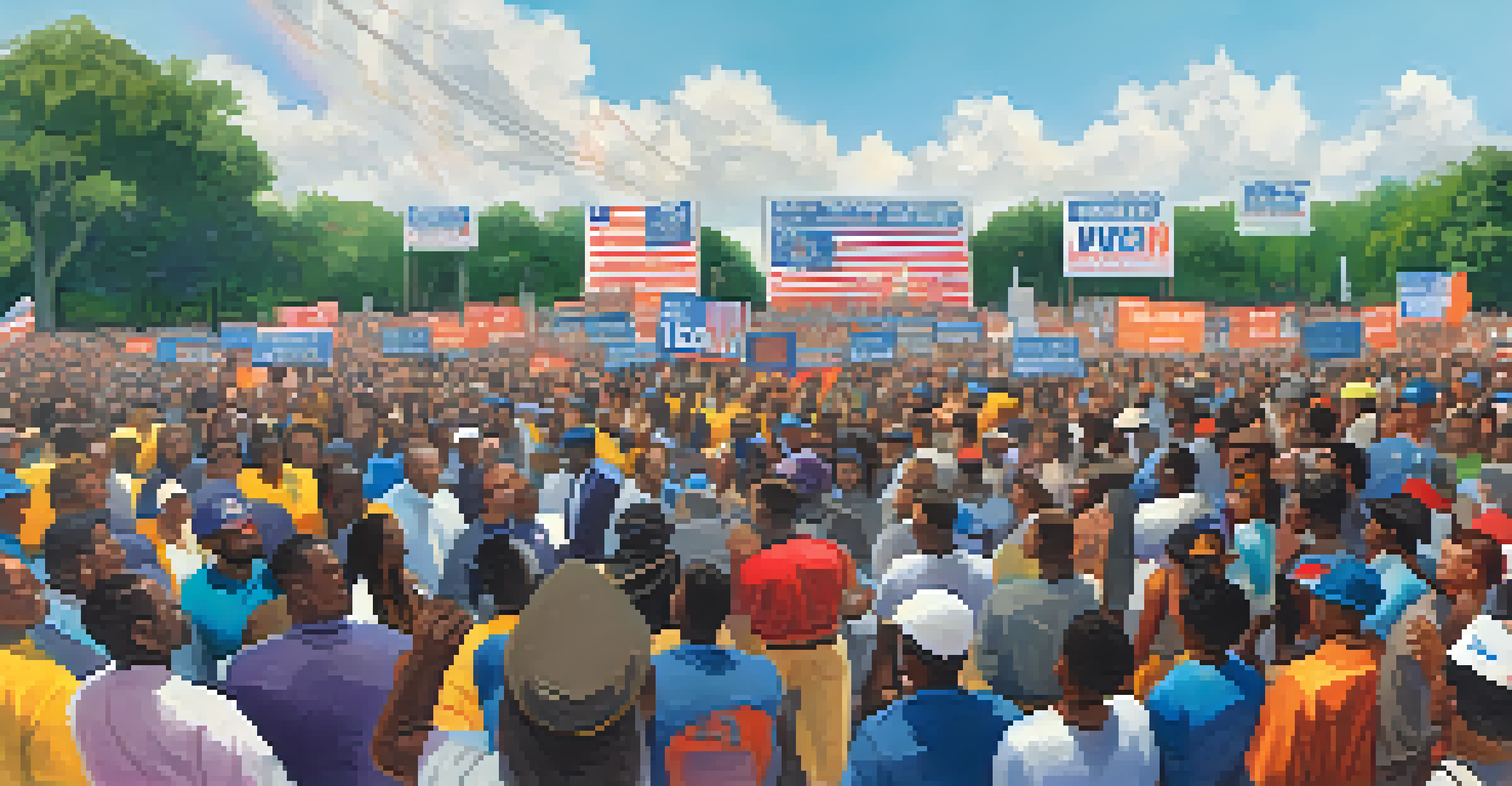Louisiana's Political Parties: Roles and Dynamics Explained

Overview of Louisiana's Political Landscape
Louisiana's political scene is a vibrant tapestry woven from diverse influences, historical events, and cultural nuances. With a unique blend of Cajun, Creole, and Southern traditions, the state's politics often reflect its rich heritage. This complexity is compounded by the presence of various political parties, each embodying distinct ideologies and priorities.
Politics is not a game; it is a way of life. The more we engage, the more we can shape our communities.
The state's political framework operates under a system that supports both major and minor parties, creating a dynamic environment for governance. Key players include the Democratic Party, the Republican Party, and several smaller parties that cater to specific interests. Understanding this landscape is crucial for grasping how legislative decisions are made and how elections unfold.
Louisiana's political parties are not just mere labels; they are active participants in shaping policy and public opinion. From local elections to statewide initiatives, these parties play a pivotal role in the democratic process, influencing everything from education to environmental policies.
The Democratic Party's Influence in Louisiana
The Democratic Party has a storied history in Louisiana, with roots tracing back to the post-Civil War era. Historically, it has championed issues like civil rights, social justice, and economic equality, resonating with many voters in urban areas. Despite recent challenges, the party continues to maintain a significant presence, particularly in New Orleans and Baton Rouge.

In recent years, the Democratic Party has adapted its strategies to engage younger voters and address contemporary issues such as climate change and healthcare access. This evolution reflects a broader national trend, where parties are increasingly focusing on inclusivity and progressive values. Local candidates often emphasize grassroots movements and community organizing to rally support.
Diverse Political Landscape in LA
Louisiana's politics reflect a rich mix of cultural influences and party ideologies, shaping legislative decisions and electoral outcomes.
Furthermore, the Democratic Party's role in state governance involves collaboration with various advocacy groups. By aligning with organizations focused on education, health, and environmental protection, they aim to amplify their impact and drive legislative change.
The Republican Party's Position in the State
The Republican Party in Louisiana has gained traction over the past few decades, positioning itself as a major force in state politics. Traditionally aligned with conservative values, it emphasizes fiscal responsibility, limited government, and individual freedoms. This resonates particularly well with rural voters and those seeking lower taxes and reduced regulations.
In a democracy, the people get the government they deserve.
The party's strength was showcased in recent elections, where it successfully captured key offices and legislative seats. Its focus on issues like education reform and crime reduction has attracted a wide range of supporters. Additionally, the Republican Party often leverages national trends to enhance its appeal, aligning with broader conservative movements across the U.S.
Moreover, the party's grassroots efforts play a crucial role in mobilizing voters. Local events, town halls, and community engagement initiatives help to foster a sense of belonging and encourage civic participation among constituents.
Third Parties: Their Role and Impact
While the Democratic and Republican parties dominate Louisiana's political scene, third parties also contribute significantly to the state's dynamics. These parties, such as the Libertarian Party and the Green Party, often address specific issues that resonate with niche voter bases. They can provide alternative perspectives that challenge the status quo and push major parties to refine their platforms.
Third parties frequently focus on issues like environmental sustainability, personal liberties, and criminal justice reform. By bringing these topics to the forefront, they can influence mainstream political discourse, even if they don't always win major elections. Their presence encourages voters to consider a wider range of options, fostering a more vibrant political environment.
Growing Influence of Independents
Independents are increasingly impacting Louisiana's elections by prioritizing issues over party affiliation, prompting major parties to adapt their strategies.
Additionally, third parties can act as spoilers in elections, drawing votes away from major party candidates. This can lead to unexpected outcomes and shifts in political power, demonstrating the nuanced ways in which all parties interact within the state's electoral system.
The Role of Independents in Louisiana Politics
Independents—voters who do not align with any political party—play an increasingly important role in Louisiana's elections. This group often seeks candidates who prioritize issues over party affiliation, reflecting a desire for pragmatic governance. Their influence can be seen in both local and statewide races, where candidates often tailor their messages to appeal to this diverse electorate.
The rise of independent voters has prompted both major parties to reconsider their strategies. As more voters identify as independents, parties are compelled to broaden their platforms and address a wider array of concerns. This can lead to a more competitive political landscape, where candidates must engage with constituents on a more personal level.
Moreover, independents can significantly impact election outcomes, especially in tight races. Their ability to swing votes makes them a crucial demographic that candidates cannot afford to overlook. Engaging with this group often requires a focus on transparency, accountability, and direct communication.
The Impact of Local Elections on State Politics
Local elections in Louisiana serve as the bedrock of the political system, often influencing broader state and national trends. These elections determine key positions such as mayors, council members, and school board officials, who play a vital role in shaping community policies. The outcomes of local races can set the stage for future statewide campaigns and initiatives.
Moreover, local elections often reflect the unique challenges and priorities of individual communities. Candidates typically focus on issues like public safety, education, and infrastructure, which resonate deeply with voters. This localized approach can lead to significant shifts in power dynamics, as grassroots movements gain momentum and drive change from the ground up.
Challenges for Political Parties
Political parties in Louisiana face challenges like voter apathy and misinformation, which complicate their operations and electoral success.
The interconnectedness of local and state politics means that successful candidates often leverage their local victories to launch broader campaigns. This can lead to a pipeline of political talent, where local leaders transition to higher offices, bringing their community-focused perspectives with them.
Challenges Facing Political Parties in Louisiana
Louisiana's political parties face a myriad of challenges that can complicate their operations and electoral success. Issues such as voter apathy, gerrymandering, and campaign finance restrictions can hinder the effectiveness of party strategies. Additionally, the state's diverse demographics require parties to navigate a complex landscape of cultural and social issues.
Another significant challenge is the rise of misinformation and disinformation, especially during election cycles. Political parties must be vigilant in combating false narratives that can sway public opinion. This requires not only effective communication strategies but also a commitment to transparency and integrity.

Moreover, fostering unity within parties can be difficult, especially as factions emerge around varying ideologies. Striking a balance between catering to different interests while maintaining a cohesive party message is essential for long-term success. This ongoing struggle shapes how parties operate and connect with voters.
The Future of Political Parties in Louisiana
As Louisiana's political landscape continues to evolve, the roles and dynamics of its parties will undoubtedly transform. Increasing voter engagement, particularly among younger demographics, suggests a shift towards more progressive policies and inclusive governance. This could lead to a reevaluation of party platforms and strategies to better address the concerns of emerging voters.
Technology also plays a pivotal role in shaping the future of political engagement. Social media and digital platforms provide unprecedented opportunities for outreach, allowing parties to connect with voters in real-time. This shift toward digital campaigning necessitates adaptability and innovation from all political parties.
Ultimately, the future of Louisiana's political parties will hinge on their ability to remain relevant and responsive to the needs of their constituents. By prioritizing collaboration, transparency, and community engagement, these parties can navigate the complexities of modern politics and continue to play a vital role in the state's governance.